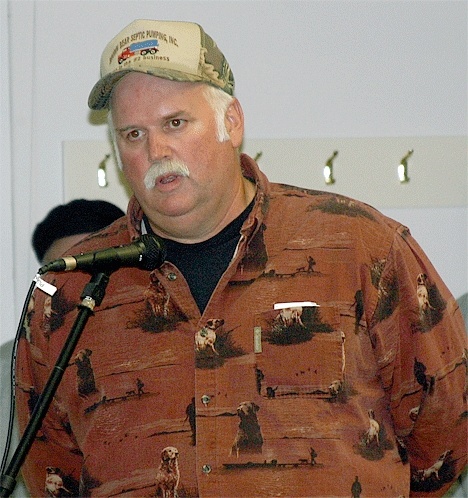An overflowing crowd of septic tank owners told the Island County Board of Health that the On-Site Sewer Operations and Maintenance Program stinks.
More than 130 residents filled the Coupeville Recreation Hall Monday night to air their grievances with the program, which requires regular inspections of septic systems in the county.
Oak Harbor resident Keith Brady was cheered for his comments suggesting the program is “overkill” and that resident should be trusted to keep their septic tanks working properly.
“I don’t need Big Brother to hold my hand…” he said. “If a system doesn’t work, the owner is immediately knee-deep in doo-doo.”
The members of the Board of Health, which includes the county commissioners, called the special meeting to discuss anxiety about the inspection requirements. A $62 fee implemented in May brought residents’ concerns to a head.
Island County Health Department Director Keith Higman said afterward that he felt the meeting was very productive, even though there were some angry outbursts. When Higman suggested during the meeting that he “might get lynched,” someone in the crowd yelled, “Good idea.”
Higman began the meeting with a history of the program, as well as startling data about nitrate pollution in wells on the island and fecal coliform in surface water. Faulty septic tanks probably cause, or at least contribute, to the pollution.
“The effluent that goes into your septic tank eventually comes out your faucet,” he said.
In an interview Tuesday, Higman said the citizens’ comments from the meeting could bring about changes in the county’s inspection program, perhaps involving the fee and rules about who can inspect certain systems. But he said many of the requirements, such as the frequency of inspections, come from the Washington State Board of Health as required by the Legislature, and the county must comply.
A number of issues bubbled to the surface as more than 20 residents spoke Monday night. The sheer cost of the program was the main concern, especially for residents with alternative systems.
People with gravity or “conventional systems” have to have their septic tanks inspected every three years. That costs anywhere from $120 to $300 to hire a county-certified professional, though residents can take a class to learn to inspect the systems themselves. In addition, the county charges $62 at the time the inspection report is filed.
Residents with alternative septic systems, such as mound systems, are required to have inspections every year. They cannot inspect the systems themselves. That means they are required to pay a professional and the $62 fee each year.
But in another wrinkle, residents with pressure distribution systems, with simple pumps, can inspect their own systems unless they live in the sensitive areas near Penn Cove or Holmes Harbor.
Most of the speakers objected to the requirement that alternative systems will be inspected annually, which is a dictate from the state Board of Health. Oak Harbor resident Brian Williams was among many residents who were upset that they couldn’t inspect their alternative systems, which was a decision made by the county Board of Health.
“This personally insults my intelligence and my ability,” he said.
Ron Brown, owner of Brown Bear Septic Pumping of Clinton, agreed that the inspection requirements are too frequent, but he was concerned about people’s ability to inspect the systems themselves. He said some are very complicated and not so easy to fix.
Many people in the audience didn’t like the $62 fee, especially when they found out why it is so high. Higman said he expects low initial compliance with the program among the estimated 26,000 septic tank owners in the county, so the fee had to be at a level to make up for all those who won’t pay. The program costs about $200,000 a year to run.
“You should bust their chops,” Kirby Stevens of Coupeville said about those who don’t comply.
Higman agreed that the fee at the time of inspection is a bad idea because it acts as a disincentive to comply. He said the county Board of Health adopted the fee against his advice. He suggested that the county commissioners should create a special district and collect a fee through the property tax system. Everyone with septic tanks would pay, so the fee would only have to be about $7.
Island County Commissioner Helen Price Johnson told the crowd that she never intended for the fee to be a permanent, but it was just a stopgap measure amid a fiscal emergency. The fee was adopted while the county was dealing with a $2 million budget shortfall.
Other residents complained that septic tanks are being unfairly targeted for causing pollution. Some people said the real concern should be old beach cabins with ancient septic systems. Others pointed out that there’s much larger sources of pollution in Puget Sound, from cruise ships to Canada dumping raw sewage.
“It’s like putting a Band-Aid on a double amputee,” Chris Simundson of Coupeville said.
Still, the program has had success. Aaron Henderson, the county’s director of environmental health, said 24 “failed” septic tanks were discovered so far.



